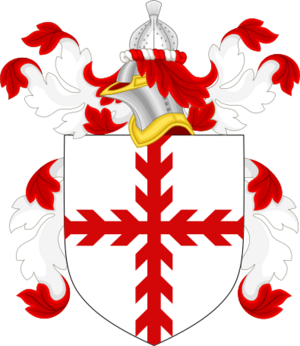Henry Lawrence (President of the Council) facts for kids
Henry Lawrence (1600–1664) was an English politician and a Puritan. He studied at Emmanuel College, Cambridge. He held several important jobs in the government, including being a commissioner for plantations and for Ireland. He also served as a Member of Parliament (MP) for Hertfordshire and Carnarvonshire. From 1654 to 1659, he was the Lord President of the Council of State, which was like being the chairman of a very important government committee. He also wrote books about religious topics.
Biography of Henry Lawrence
Henry Lawrence was born in 1600. He was the oldest son of Sir John Lawrence. Henry went to Gray's Inn, a famous law school, and then studied at Queens' College and Emmanuel College in Cambridge, where he earned his master's degree in 1627.
While at college, Henry was part of the Puritan group. Puritans were Protestants who wanted to make the Church of England simpler. Henry was related to Oliver Cromwell, who later became a very powerful leader in England. Henry even rented his house and farm in St. Ives to Cromwell for several years.
Around 1638, Henry moved to Holland, probably to avoid problems with the Church in England. He came back in 1641, but left again when the English Civil War started. He returned to England for good in 1646.
In 1646, Henry became a Member of Parliament (MP) for Westmorland. In 1648, he was made a commissioner for plantations, which meant he helped manage England's colonies.
In 1649, Henry Lawrence disagreed strongly with the trial and execution of King Charles I. This upset Oliver Cromwell. In 1652, Henry visited Ireland as a commissioner.
On July 14, 1653, he joined the Council of State, a powerful government group. He was also on several committees. In 1653, Henry was an MP for Hertfordshire. After Parliament was dissolved, he joined Cromwell's new Council of State and earned a good salary. In November 1653, he became the Keeper of the Library at St. James's House.
Henry was first made chairman of the Council of State for a month. But then, Oliver Cromwell made him the permanent chairman, giving him the title "Lord President of the Council." A famous writer named John Milton praised Henry Lawrence for his skills and knowledge.
In 1654, Henry was again an MP for Hertfordshire. In 1656, he was chosen to be an MP for both Colchester and Carnarvonshire. He chose to represent Carnarvonshire. In 1657, he was made a member of "Cromwell's Other House," which was like a second house of Parliament.
When Oliver Cromwell died in 1658, Henry Lawrence announced that Richard Cromwell, Oliver's son, would be the new Protector. Henry stopped being president in July 1659.
After the king was restored to power in England, Henry Lawrence retired to his manor in Hertfordshire. He died there on August 8, 1664, and was buried in the local church.
Family Life
On October 21, 1628, Henry Lawrence married Amy, the daughter of Sir Edward Peyton. They had seven sons and six daughters. Their oldest son, Edward or Henry, was the person John Milton wrote his twentieth sonnet to. Another younger son, John, moved to Barbados and then to Jamaica, where he became a wealthy plantation owner.
Published Works
Henry Lawrence wrote several books, mostly about religious topics:
- Of Baptisms (1646): This book was about the Christian practice of baptism. Another version was called A Pious and Learned Treatise of Baptism (1649).
- Of our Communion and Warre with Angels (1646): This book was about how people connect with angels.
- Some Considerations tending to the Asserting and Vindicating of the Use of the Holy Scriptures and Christian Ordinances (1649): This work explained why the Bible and Christian practices like baptism were important. Another version was called A Plea for the Use of Gospel Ordinances (1652). He dedicated this book to his mother.
 | Emma Amos |
 | Edward Mitchell Bannister |
 | Larry D. Alexander |
 | Ernie Barnes |


